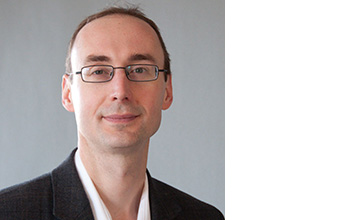College of Arts and Sciences Newsroom

UDSMART Center Leader
Doug Daniels, a biochemist who led a team of creative scientists seeking new ways to fight fatal diseases, will be the first executive director of the University of Dayton SupraMolecular Applied Research and Technology Center.
Daniels comes to the UDSMART Center from the Broad Institute of MIT and Harvard in Cambridge, Massachusetts, where he served as director of protein science and structural biology. Founded by Harvard University and the Massachusetts Institute of Technology, the institute seeks to discover the molecular basis of major human diseases, develop new approaches to diagnostics and treatment, and share those discoveries openly with the scientific community.
Daniels’ research group brought together academic and industry experts to focus on discovering new drugs for targets thought to be “undruggable,” including genes for coronary artery disease and cancer.
“As part of a nonprofit environment, my research group sat at a nexus of collaboration between principal investigators at various institutions, industrial partners and contract research organizations, so we almost exclusively did multi-institutional work,” Daniels said. “Hopefully, those experiences working day-to-day with collaborators across those institutions will help me enable and encourage researchers at UD.”
Daniels starts Aug. 15 and will also hold the position of research professor in chemistry at the University.
The UDSMART Center brings together scientists and engineers with interests in supramolecular science, with the hope of translating their research to clinical applications. Faculty include chemistry professor Shawn Swavey and biology professor Jayne Robinson, who both recently received a patent for synthesizing a zinc compound that can kill antibiotic-resistant bacteria without light activation.
“One of the many goals of the center is to bring research from the benchtop to bedside,” Swavey said. “With Doug’s extensive research experience, at the highest level, we stand a much better chance of reaching that goal.”
Before joining the Broad Institute in 2012, Daniels led research teams at the Novartis Institutes for Biomedical Research, also headquartered in Cambridge, where he worked on protein treatments for diabetes.
Previously, he was a National Institutes of Health postdoctoral fellow in the Yale University department of chemistry.
Daniels hopes his experience establishing and managing research collaborations will allow him to build on the success of UDSMART. Already, Swavey and Robinson have attracted industry partners with their work.
“Our highest-level goal is to foster a supportive and open interdisciplinary research environment,” Daniels said. “There are several aspects of that. One is to create an easy way for faculty to become UDSMART Center-affiliated, and to make that a successful and rewarding experience.”
Daniels also would like to involve more students in interdisciplinary research, which would allow them to develop skills in their chosen field and then learn how to apply those skills to solve problems in other areas.
“We need to create unique and meaningful research opportunities for the students who are associated with the center, and make sure we have broadly encompassing programs that go beyond a focused research experience, educating the whole person,” he said.
To increase the visibility and impact of faculty research, Daniels plans to look for both early- and late-stage partnerships with biotechnology and pharmaceutical companies, granting agencies, nonprofit organizations and other academic institutions.
“I am delighted Dr. Daniels will be joining our academic community,” said Jason Pierce, College of Arts and Sciences dean. “He is an accomplished scientist and effective collaborator who, having led teams at some of the nation’s top biomedical research institutions, brings significant experience in interdisciplinary work and clinically relevant science. I am eager to see the expanded reach and impact of the UDSMART Center under Dr. Daniels’ leadership.”
Daniels hold bachelor’s degrees in chemistry and cellular and molecular biology from the University of Michigan, and a doctorate in biochemistry and structural biology from the Scripps Research Institute in La Jolla, California.
The mission of the UDSMART Center is to develop a sustained collaboration of experts from the sciences and engineering, centered around supramolecular science, to develop ideas and transfer them from the benchtop to application with the goal of bettering the lives of people around the world. In the process, this center will help to educate future scientists and engineers and serve the community of Dayton.
- Dave Larsen, communication coordinator, College of Arts and Sciences
